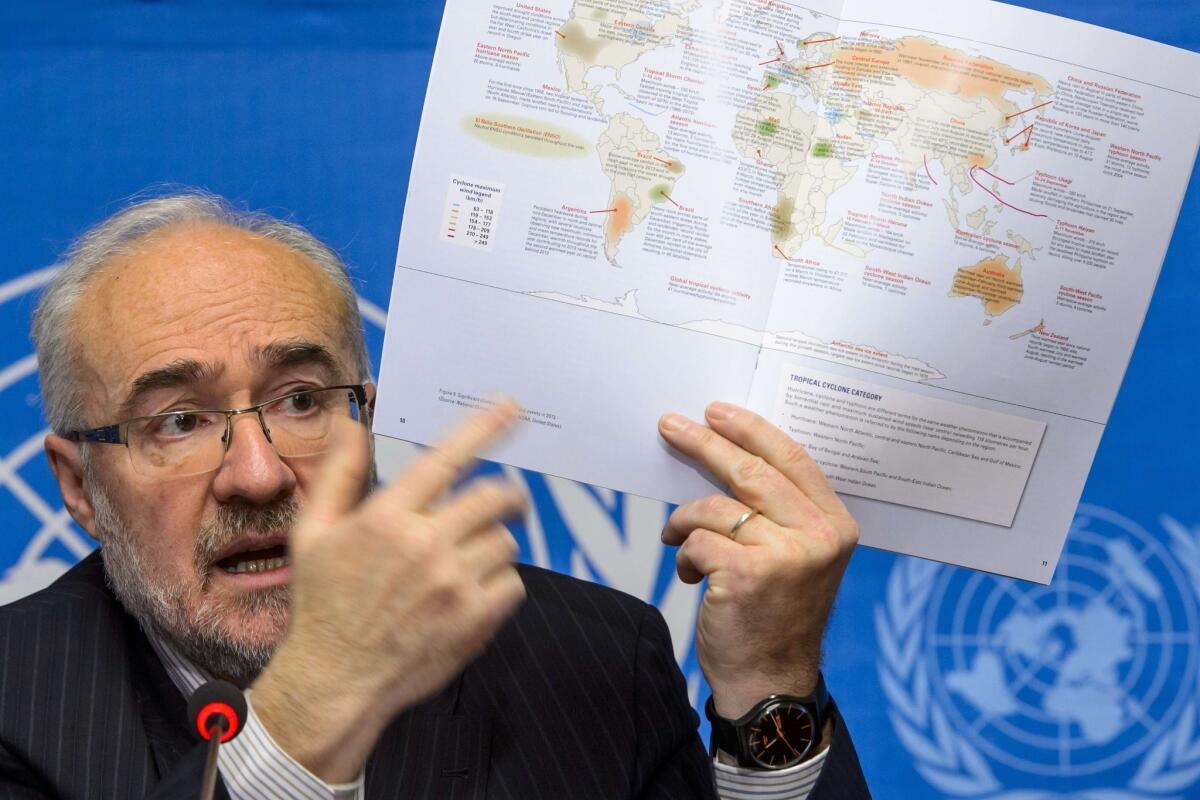Climate change: While we fiddle, the world burns ... and floods and parches

- Share via
Here’s a statistic for you. Out of 10,855 peer-reviewed articles in scientific journals last year that dealt with some aspect of global warming, all but two accepted human behavior as the primary cause. Oddly, that represents a bit of backsliding. The previous year, only one study rejected human factors, according to an annual roundup by geochemist James Lawrence Powell and reported by Salon.
Science is not a theory but a process, a mechanism for distilling truth from observation. As astrophysicist and new “Cosmos” host Neil de Grasse Tyson told Stephen Colbert: “That’s the good thing about science: It’s true whether or not you believe in it. That’s why it works.” And the process of knowledge, according to those in the best seats to observe it, is that global warming is happening, we’re causing it, and we’re at the stage where irreversible changes to the environment are underway.
Yet we dither over what to do, while some would-be opinion-shapers and elected political leaders — apparently channeling the Koch brothers’ view of the world — deny that human actions are responsible. From Lindsay Abrams at Salon, quoting from Powell:
Very few of the most vocal global warming deniers, those who write op-eds and blogs and testify to congressional committees, have ever written a peer-reviewed article in which they say explicitly that anthropogenic global warming is false. Why? Because then they would have to provide the evidence and, evidently, they don’t have it.
What can we conclude?
1. There is a mountain of scientific evidence in favor of anthropogenic global warming and no convincing evidence against it.
2. Those who deny anthropogenic global warming have no alternative theory to explain the observed rise in atmospheric CO2 and global temperature.
These two facts together mean that the so-called debate over global warming is an illusion, a hoax conjured up by a handful of apostate scientists and a misguided and sometimes colluding media, aided and abetted by funding from fossil fuel companies and right-wing foundations.
A cynic could see that as willful diversion by those wringing wealth out of fossil fuels, the environmental consequences be damned. And we let them. Which leads me to a new and short essay in the New York Review of Books by novelist Zadie Smith on the small variations wrought by climate change in England, where she lives, and in our acquiescence to the forces that could well kill us:
Maybe we will get used to this new England, and — like the very young and recently migrated — take it for granted that April is the time for shorts and sandals, or that the New Year traditionally announces itself with a biblical flood. They say there will be butterflies appearing in new areas, and birds visiting earlier and leaving later — perhaps that will be interesting, and new, and not, necessarily, worse. Maybe we are misremembering the past! The Thames hasn’t frozen over for generations, and the dream of a White Christmas is only a collective Dickensian delusion. Besides, wasn’t it always a wet country?
It’s amazing the side roads you can will yourself down to avoid the four-lane motorway ahead. England was never as wet as either its famous novels suggest or our American cousins presume. The weather has changed, is changing, and with it so many seemingly small things — quite apart from train tracks and houses, livelihoods and actual lives — are being lost. It was easy to assume, for example, that we would always be able to easily find a hedgehog in some corner of a London garden, pick it up in cupped hands, and unfurl it for our children — or go on a picnic and watch fat bumblebees crawling over the mouth of an open jam jar. Every country has its own version of this local sadness. (And every country has its version of our arguments, when it comes to causation. Climate change or cars? Climate change or cell phone sites?) You’re not meant to mention the minor losses, they don’t seem worth mentioning — not when compared to the visions of apocalypse conjured by climate scientists and movie directors. And then there are all those people who believe that nothing much is happening at all.
Smith moves onto something of cliche territory, imagining what her future grandchild will think of the world we have let spin out of environmental balance, and whether the girl will forgive the grandmother.
Oh, what have we done! It’s a biblical question, and we do not seem able to pull ourselves out of its familiar — essentially religious — cycle of shame, denial, and self-flagellation. This is why (I shall tell my granddaughter) the apocalyptic scenarios did not help — the terrible truth is that we had a profound, historical attraction to apocalypse. In the end, the only thing that could create the necessary traction in our minds was the intimate loss of the things we loved.
ALSO:
Think Russia’s land grab is unique? Think again.
How anti-gay Christians evangelize hate abroad
Follow Scott Martelle on Twitter @smartelle
More to Read
A cure for the common opinion
Get thought-provoking perspectives with our weekly newsletter.
You may occasionally receive promotional content from the Los Angeles Times.







